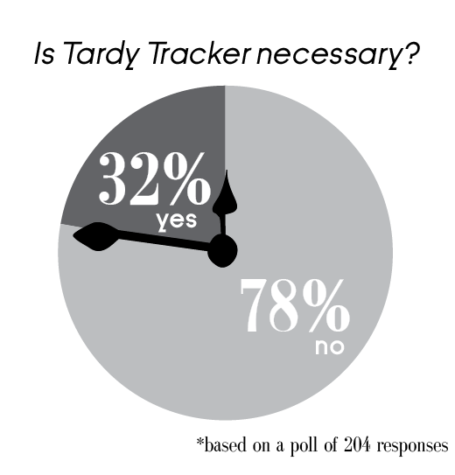The Temptations of Tardiness
In recent weeks, BV has ratcheted up its response to tardy students, as well as acknowledged the growing attendance problem seldom allowing for full classrooms. Students arriving minutes or even seconds after the bell can expect a trip down to the notorious tardy tracker, where they could spend anywhere from 5 to 15 minutes waiting to register their overdue arrivals.
In regards to attendance, courses have taken on a rather “optional” feel for some students who find their time to be more valuable outside the walls of their last-hour math or history class.
The tardy crackdown of teachers and repeated early departures of students have left both groups in a fog of frustration, but before jumping into personal accounts, it’s necessary to look at the facts of the situation.
Over the last year, BV has witnessed 2,562 tardies — a 16% increase from the 2019-2020 school year. The school was also relatively lenient with late students during 1st semester due to construction and parking challenges, meaning that there were likely many more untimely arrivals than recorded. Principal Scott Bacon additionally noted BV has recorded “considerably more” individualized absences this year than in pre-Covid times.
These attendance issues, however, are not unique to BV. Across the nation, schools are seeing higher rates of absenteeism. The reasons? A myriad of causes ranging from mandatory quarantines to entirely optional parent check-outs, which are leaving classroom chairs empty.
According to the Wall Street Journal, in New York City, the country’s largest school district saw its overall attendance rate drop beneath 70% after winter break, a drastic decline from the 91% of students typically in the classroom in pre-pandemic years.
Not only does this decrease hurt students in their pursuit for a quality education, it confronts teachers with the challenge of planning around dozens of sporadic schedules.
As administrators and teachers search for local solutions to a national problem, the BV community, students, parents and educators alike, must wrestle with the consequences of students not showing up on time — if at all. Read on to discover the harrowing effects the temptation of tardiness has left on the BV student body.
Tardy Targets
Late students analyze tightening of tardy tracker policy
The transition to second semester brought with it a clear crackdown on the enforcement of BV’s attendance policy. Sophomores Joaquin Acosta, Jack Morgan and Josh Gordan reflect on the arrival policy with mostly resentment as its effects are amplified for the group of students who have the tendency to be late.
“I think [the attendance policy] is really dumb because it’s not going to stop people [from being late],” Gordon said. “It’s taking people even more time to go to the tardy tracker than to just go to class, so they’re just punishing people. It’s not changing anything.”
Acosta discerns the meaning behind the policy but still senses it is lacking.
“I have mixed feelings about it,” Acosta said. “I understand why they do it, but I also think there’s a lot more cons than pros.”
A common thread of excuses accounts for most of the late arrivals at BV.
“The struggle is [that] once you get closer to school, the traffic just gets really bad,” Acosta said. “It would be really nice if some of the staff were more graceful and understanding of that.”
Morgan is an outlier with his tardy explanations.
“The main thing that makes me late is my dog — he likes to run away a lot,” Morgan said. “I also just don’t leave early enough or I’ll just not wake up because I don’t feel like it.”
Gordon trusts in the leniency of his teachers when he is running behind schedule.
“I just sit in my car and then go in because I know I rarely get sent to tardy tracker,” Gordon said. “I’ll be late and just say something happened that caused me to be late. It’s usually fine because I’m in class and my teachers are pretty rational and realize that sending me to tardy tracker is just going to make me more late.”
In regards to amending the policy, the students have several ideas.
“I would change it to where you can be 10 minutes late, but they can still start the lesson,” Morgan said. “I don’t think they should count you tardy, and I think we should [at least] have more tardies than six — I’m at six right now and now I have to go to detention on Tuesday.”
 Acosta agrees the system is overly strict.
Acosta agrees the system is overly strict.
“If you have a reason you’re tardy, then you should not have to go to detention,” Acosta said. “For example, the weather or something that was out of your control. I know that’s not [currently] the case but I think that should be.”
Another idea was issued by Morgan.
“I think [the policy] should change by having us stay a little after class [or] after school,” Morgan said. “If you’re 10 minutes late, you [would] stay 10 minutes after school.”
Gordan feels the tardy policy overstates the actions actually applied by most staff.
“They don’t implement [the punishments] or do anything about [tardies],” Gordon said. “They keep saying your next punishment will be this or that, but it never even happens.”
Morgan feels differently after his encounters with a stern implementer of the policy.
“One of my teachers — if I’m like 20 seconds late — she’ll send me to tardy tracker even though I’m in class before her. It kind of makes me mad,” Morgan said. “My other teacher
is pretty chill about it and if I get to class, maybe like two or three minutes late, she won’t send me to tardy tracker but I think she’s starting to crack down on it.”
Acosta concluded the policy, although it has its flaws, is best when enacted with more leniency.
“Different teachers handle [late arrivals] in different ways. Some are very strict and will immediately send you to the tardy tracker, which I think is not the most fair thing they can do,” Acosta said. “Others give a two-minute grace period, which I think is perfectly fair — different teachers [have] different responses.”
Teaching Timeliness
Administration explains importance of punctuality
Research has shown that there is a direct correlation between a student’s attendance and their academic performance. At Blue Valley, overall attendance has been impacted in the last few years due to Covid, which has given Principal Scott Bacon and Assistant Principal Mark Dalton insight into why students are late and how they can assist them.
With the effects of quarantine being seen in everyone, changes need to be made to help struggling students.
“It’s been hard because of Covid — our attendance was negatively impacted. This year, I would say that we’ve got a number of students who are struggling with attendance, maybe more so than we’ve had before,” Bacon said. “I think some students are really struggling mental health wise. That’s getting in the way of their attendance and [we’re] trying to work with those students and keep them on pace.”
Due to the access to technology the occasional mental health day, sick day, or personal conflict will not set a student way behind in class. However, students need the environment of a classroom with a teacher there to help in order to get the most out of their education.
“You can learn at home a little bit, especially with Canvas now,” Dalton said. “But in the end, there’s nothing like having that instruction, being able to work through problems or ask questions.”
Even though attendance is not at its best, it is on the right track and is slowly recovering.
“Overall our attendance is pretty strong — it may not be as strong as pre-Covid but this year has been a far better year than last year,” Bacon said. “We track it every quarter and in terms of the number of students that missed 10 or more days, it wasn’t that much different than pre-Covid. It was a little higher but not startling.”
One important aspect of attendance is getting to class on time. For a while, teachers and administrators were flexible due to construction and the challenge of getting used to returning to school full time. With the completion of the new additions, teachers have been urged to become stricter with students arriving late.
“That flexibility started to become the norm, and that’s not the direction that we wanted to go second semester,” Bacon said. “We tightened it up and we said, ‘We don’t ask a lot. We just ask that our students be respectful and responsible,’ and, part of being responsible is being on time.”
Class starts as soon as the bell rings; therefore, it is important that students are in class and ready to learn. Coming into class late not only hurts the particular student but can also interrupt instruction.
“As a math teacher, I always started with [what I called] testables, and there was a good chance that was going to be on the test somewhere,” Dalton said. “If a kid missed those on a regular basis, they missed a lot of review for what was important to learn, so it’s important to be on time.”
 Everyone is late once in a while, but it is important to not make it a habit. Both Bacon and Dalton agreed that if a student consistently struggles with getting to school on time, they need to make changes to their morning routine.
Everyone is late once in a while, but it is important to not make it a habit. Both Bacon and Dalton agreed that if a student consistently struggles with getting to school on time, they need to make changes to their morning routine.
“If you can be consistently five minutes late, then you can consistently be five minutes early — you just have to change one habit — get up five minutes earlier, and then everything’s taken care of,” Dalton said. “Everybody’s late once in a while, so there’s grace. That’s why we give five [tardies] before we start giving a consequence. It’s not like we expect people to be perfect, but [we have] a reasonable expectation of being on time.”
Being responsible and punctual are skills needed to thrive after graduation.
“We’re trying to help prepare you to be successful as you walk away from here into whatever is next, and we’ve had a pretty high rate of success at doing that,” Bacon said. “I would encourage our students to do the little things like being here on time because it will make a big difference. Doing the little things well makes big things happen.”
Teacher’s Take
Two teachers explain their differing takes on Tardy Tracker
As the school year progresses, it is known that students begin to gradually lose motivation — and showing up on time starts to feel like less of a priority. The second semester slump is not only felt by students, but teachers as well, who must send their students to the tardy tracker.
“I feel like there has been an increase this year for sure of people being tardy to school, not necessarily to classes in the middle of the day, but tardies to school,” history teacher Jennifer Buchanan said. “I feel like a lot of that is because while we were going through the pandemic, students were trained that if they were late, it wasn’t as big of a problem because everything would be spelled out for them — lessons were a lot more independent on their computer. Now that we’re back to a bit more of a normal school day, it’s impacting students and their ability to keep up with classes.”
Although students may feel resentment from their teachers who have increased their use of Tardy Tracker, it is merely following orders.
“Mr. Bacon was pretty clear with the staff that it was an expectation that students go to Tardy Tracker when they’re late in the morning,” Buchanan said. “So that’s what I do — they go to Tardy Tracker.”
Because Tardy Tracker had not been regulated as strictly in the past, the first few days with the enforced policy were an adjustment for students.
“I greet my students at the door, so I’m able to see the hallways,” she said. “It just took a couple of days for students to figure out that it was more of an expectation now. More people are getting to class and school on time now.”
It is not a secret that most students do not feel fondly about this system of tardy regulation, but when examining the consequences, it is fairly lenient and allows students several warnings prior to stricter action.
“I feel like with the way Tardy Tracker is set up, the first [several] times — it’s just a written warning, and there’s really no consequence,” Buchanan said. “It offers a lot of grace for students to be tardy without any consequence. So in that way, I don’t feel like it’s not understanding a student and where they’re coming from.”
Buchanan feels the primary issue resulting from tardiness is the class instruction students are not in attendance for.
“I would say, especially in core classes, it’s probably an issue where they’re missing out on directions for the class,” Buchanan said. “I feel like continual tardiness puts those students behind.”
Other teachers agree that it may be considered simple and second-nature for students to be on time when walking into school. However for some students, it may be a challenge that they have to go through each day.
For English teacher Michael McCosh, he has seen students come in late, specifically third quarter.
“It’s important that kids understand how to manage their schedules and be where they need to be on time,” he said. “It’s expected in the real world that you’re able to do that.”
While McCosh has seen some students showing up late and not giving the effort they necessarily should have, he also thinks there is a balance between both school and personal life.
“There’s a sense of ‘I have to maintain a positive relationship with students, so I’m going to let them walk in behind’ or ‘I’m just slow that day and getting class started,
so they didn’t miss anything,’” he said. “Also, what I have to consider is [that] I need to hold them accountable for the long term.”
Some students think the result of being late can be a pain in the future because of Tardy Tracker.
“I think it’s the system that’s in place because there are many students in classes where my thoughts are geared toward individuals — sometimes there’s groups,” he said. “I focus on what some students do during the class period only because I want to see how they handle [tardiness] — I’m constantly thinking about how can I accommodate.”

Katelyn Collins is a sophomore, and this is her first year on staff. She plays tennis for Blue Valley High and at OPRC. Outside of school, she participates...

Ayesha Khan is a senior and is Editor-in-Chief. This is her third year on staff. She is also a captain on the Tigerette Dance Team and dances competitively...

Harrison Melton is a senior staff writer on the Tiger Print. Besides the publication, Harrison is a leader of Axis Dance Crew and enjoys performing...

Elle Moulder is a sophomore and this is her first year on staff. She is currently a student at the University of Alabama Early College. She wants to...

Andrew Sharber is a senior and this is his third year on staff. He has been in the band since middle school and enjoys traveling with both the marching...

Charley Thomas is a senior and serves as Editor-in-Chief of the Tiger Print this year. At BV, she is a member of the Varsity Volleyball Team, Student Council,...

Isabella Vaz is a sophomore in her second year on staff. She enjoys hanging out with friends, traveling, and watching Netflix. Her favorite thing to do...





